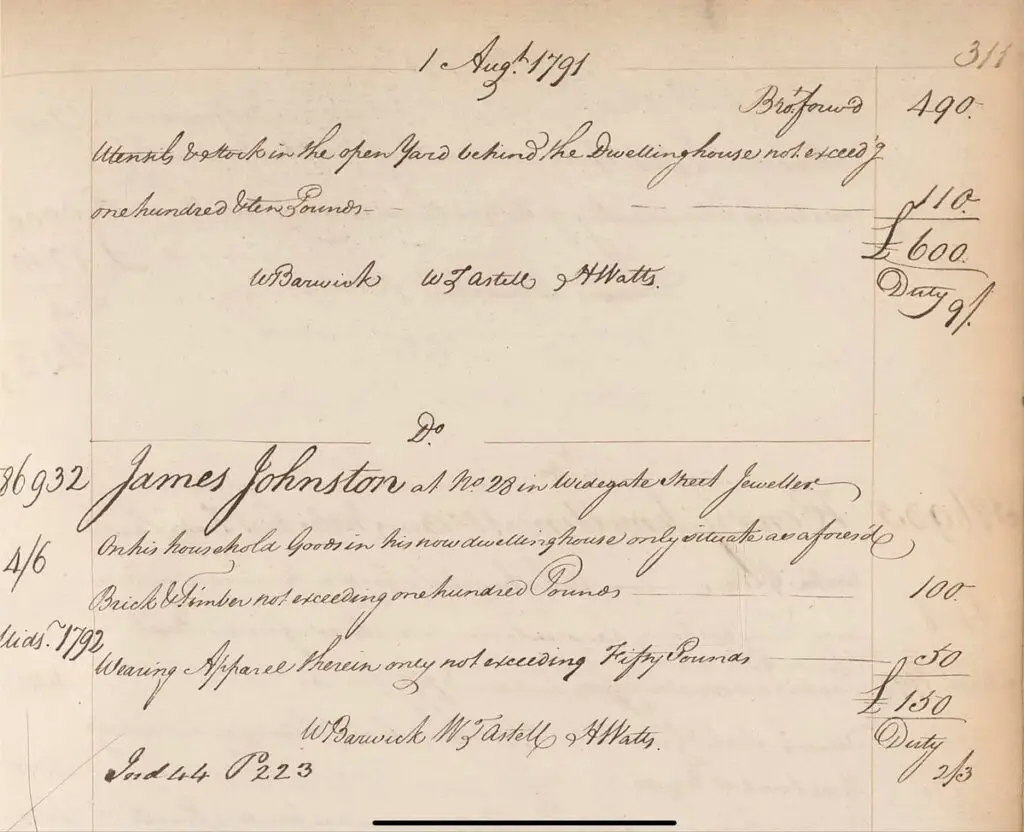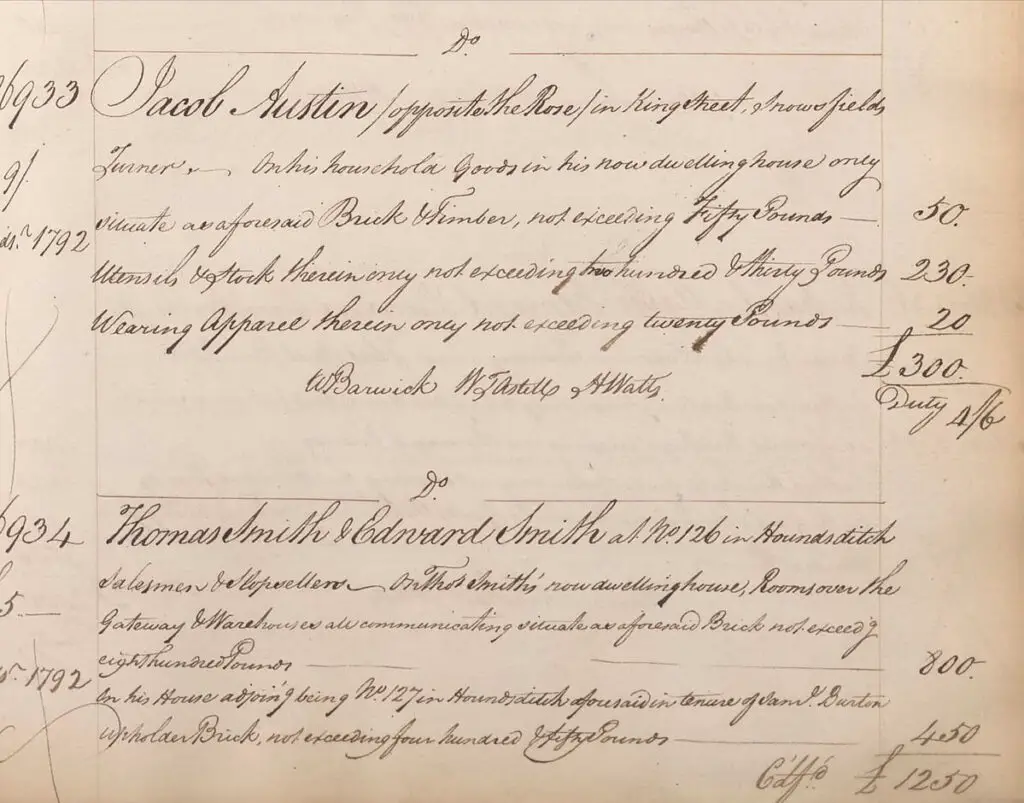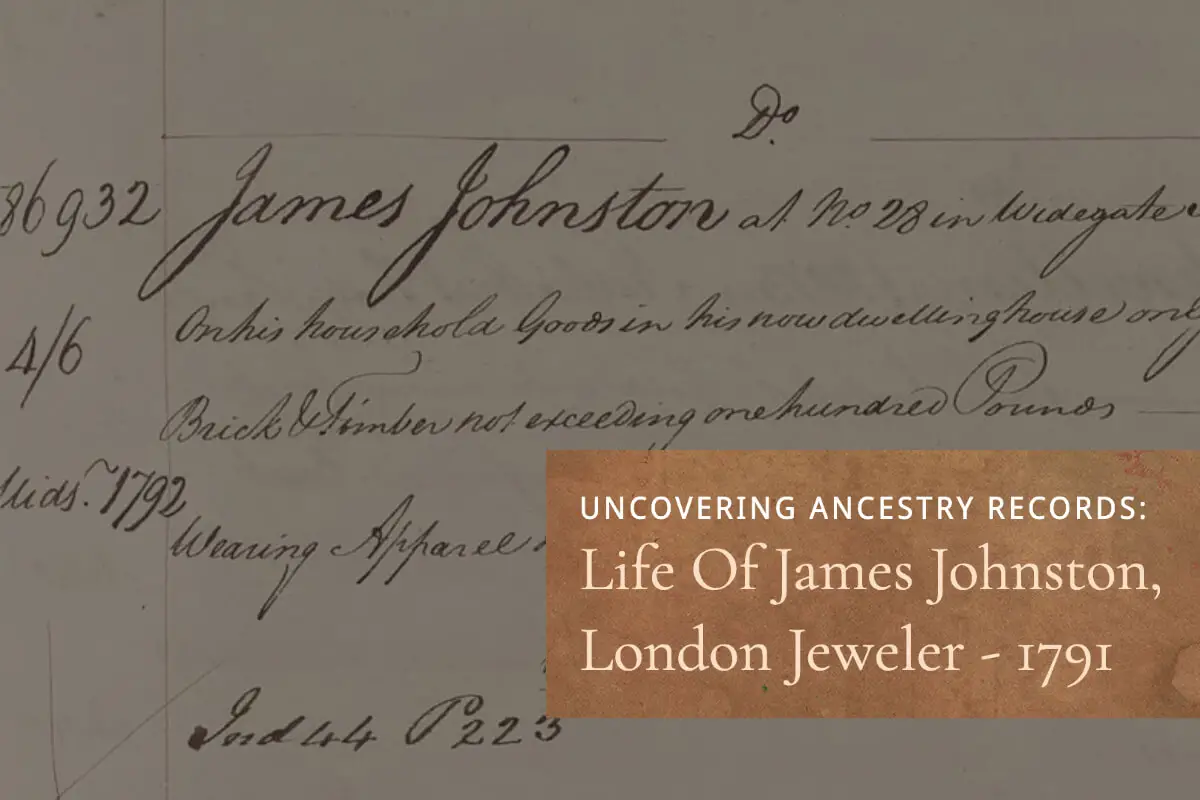Embarking on a journey to explore one’s family history can be exciting and fulfilling. It is like being a detective, piecing together clues and unearthing hidden stories from the past.
Recently, I stumbled upon a remarkable record online about my great-grandfather, James Johnston, who had a jewelry business in London in 1791. Read on as we will delve into the significance of this discovery and how ancestral records offer valuable insights into the lives of our predecessors.
Table of Contents
- Find An Ancestry Record: A Window Into The Past
- The Genealogical Detective: Piece By Piece You Put Together Ancestor’s Records
- Connecting With Our Ancestors Through Ancestry Records
- Related Questions
Find An Ancestry Record: A Window Into The Past
Finding a record of James Johnston’s jewelry business through the London Metropolitan Archives was pivotal in my genealogical quest. This archival institution, with its extensive collection of historical documents, proved to be an invaluable resource.
Although the record may not appear remarkable at first glance, it holds several vital details that shed light on James Johnston’s life.
Confirmation Of Name Spelling As James Johnston
One of the primary benefits of ancestral records is the ability to clarify information and dispel misconceptions. In my case, the record confirmed that my great-grandfather’s name was James Johnston, not Johnstone, as some family members had assumed.

Or it could be when he moved to England, he dropped the “e” off his name but instead used just Johnston instead of Johnstone.
This discovery illustrates the importance of relying on primary sources to establish real family names, eliminating potential errors or confusion passed down through generations and then putting copies of those names in a place where it is organized, such as Family Search.
Address Of The Jewelry Business For James Johnston
The record also provided insights into the physical location of James Johnston’s jewelry business. Studying the address mentioned in the document (28 Widegate Street, London) gave me a sense of the geographical context in which my ancestor operated.

This knowledge allowed me to visualize the bustling streets of London in 1792 and imagine the vibrant atmosphere of his trade. It also gave me a location visit on my next trip to London, and Google Maps allowed me to see his physical location as it looks today.
Understanding His Financial Situation
Furthermore, the record offered glimpses into James Johnston’s financial situation. Although the information provided might be limited, it hinted at his professional success and economic stability during that period.

These details provided a valuable window into the economic climate of the time and the possibilities available to a jeweler operating in London.
The Genealogical Detective: Piece By Piece You Put Together Ancestor’s Records
Engaging in family history research is akin to being a detective, patiently gathering clues and connecting the dots to construct a narrative. It requires a systematic approach and a willingness to explore various sources, such as records, photographs, and personal accounts.
Starting With What You Know For Any Genealogy Research
The journey into one’s ancestry often begins with personal knowledge. Gathering information from relatives, examining family heirlooms, and investigating existing documents can provide a solid foundation for further research.
In my case, family stories passed down through the generations hinted at James Johnstone’s profession, which led me to explore records related to the jewelry industry in London.
Utilizing Online Resources
The internet has revolutionized genealogical research, making it more accessible and convenient. Online platforms, such as ancestry websites, archival databases, and historical records repositories, offer a treasure trove of information waiting to be discovered.
These resources empower researchers to access documents from across the globe, uncovering records that were once difficult to obtain.
Leveraging Archival Institutions And Other Resources
Archival institutions, like the London Metropolitan Archives, play a crucial role in preserving and organizing historical documents. These institutions employ dedicated professionals who specialize in assisting researchers with their inquiries.
By utilizing their services, researchers gain access to valuable records and expertise, enabling them to delve deeper into their family history. The London Metropolitan Archives provided a record copy, allowing me to explore the details of James Johnston’s jewelry business.
These records they had were not online, so to gain access to the records, I needed to have them photograph the record. This shows that sometimes you need to find other sources that can give you additional knowledge about your ancestor’s life and profession.
Connecting With Our Ancestors Through Ancestry Records
Unearthing ancestral records and tracing our family history not only provides us with valuable information but also deepens our connection with our ancestors. They become more than just names and dates on a family tree; they become real individuals with unique stories and experiences.
Piecing Together Lives Through Ancestry Records
Collecting and analyzing ancestral records gives us a clearer picture of our relatives’ lives. Each new piece of information is a puzzle, gradually revealing a more comprehensive understanding of their experiences, challenges, and triumphs.
By piecing together these fragments, we can reconstruct the narratives of their lives and appreciate the rich tapestry of our family history.
For instance, the record of James Johnston’s jewelry business in 18th-century London tells us about his professional pursuits and provides a glimpse into the economic and social context of the time. It allows us to imagine his skills, the craftsmanship he displayed, and the role he played in the jewelry industry.
This information fosters a sense of connection, helping us bridge the gap between past and present.
Exploring Social Context And Our Ancestors
Ancestral records are not just about individuals; they also offer insights into the societies in which our ancestors lived. By examining historical documents, we can understand the prevailing social, economic, and cultural factors that shaped their lives.
This broader context helps us appreciate the challenges they faced, the values they held, and the legacies they left behind.
In the case of James Johnstone, the record of his jewelry business can be used to explore London’s vibrant commercial landscape during 1791. We can delve into the economic conditions, trade routes, and customer preferences of the time, providing a backdrop against which James Johnston’s entrepreneurial endeavors can be understood.
This broader understanding enhances our appreciation for his achievements and the significance of his business in the context of the era.
Preserving Family Stories With Ancestors Records
One of the most rewarding aspects of genealogical research is the opportunity to preserve and share family stories. By unearthing ancestral records, we can weave narratives that celebrate our heritage and ensure that future generations remain connected to their roots.
These stories serve as a bridge between the past and the present, instilling a sense of pride, identity, and belonging within the family.
In the case of my great grandfather James Johnston, his record as a jeweler in 18th-century London becomes a captivating tale to be passed down through the generations. It provides a glimpse into the family’s entrepreneurial spirit, the legacy of craftsmanship, and perseverance in facing challenges.
Sharing these stories not only strengthens the bonds between family members but also ensures that the memory of our ancestors lives on.
The discovery of an ancestral record about my great-grandfather James Johnston’s jewelry business in 18th-century London was a significant milestone in my genealogical journey. It confirmed his name, provided his business address, and offered insights into his financial situation.
By delving into ancestral records, even those not readily available online, we become genealogical detectives, piecing together fragments of information to construct a narrative of our family’s past.
Engaging in family history and genealogy connects us with our ancestors profoundly. It allows us to transcend mere names and dates, transforming them into vibrant individuals with unique stories and experiences.
Exploring ancestral records helps us understand their lives within the social context of their time, preserving their stories and ensuring that future generations remain connected to their heritage.
So, grab your magnifying glass and embark on your genealogical journey. Uncover the hidden gems of your family’s past, piece together the puzzle of your ancestors’ lives, and honor their legacy by preserving and sharing their stories for future generations.
The Hummel Family is a website all about Family History research. We focus on Swedish, German, English, Scottish, and American Genealogy. We also discussed Asia and China, as we had ancestors who spent many years in China.
You are welcome to join us and become part of our community by signing up for our FREE newsletter, The Hummel Family; sign up by clicking here.
Also, check out our Youtube Channel, Family HIstory Buzz, by clicking here.
Related Questions
What Are The Swedish Mantal Tax Records?
The Swedish Mantal tax system was prevalent in Sweden for over 300 years. The Mantal tax was a tax placed upon Swedish households and people. The Mantal tax system was organized and structured.
You can learn more by reading our blog What Are The Swedish Mantal Tax Records? History & Genealogy Research Tips by clicking here.
What Is The Purpose Of Genealogy?
The purpose of genealogy is to study family, family history, and the tracing of our lineage or our ancestors. The purpose of genealogy goes far beyond the dates, names, and places of our ancestors. This is because you learn more about your family and yourself as you do your genealogy. Genealogy helps to unite and link families as you discover things about your family that you did not know.
You can learn more about Genealogy by reading our blog What Is The Purpose of Genealogy? by clicking here.
Any Good Alternatives To Ancestry.com?
The best alternative to Ancestry.com is FamilySearch. We like the FamilySearch program because it is free, collaborative, and easy to use. FamilySearch also offers many sophisticated functions and features that other programs would charge for.
You can learn more by reading our blog Any Good Alternatives To Ancestry.com? by clicking here.

